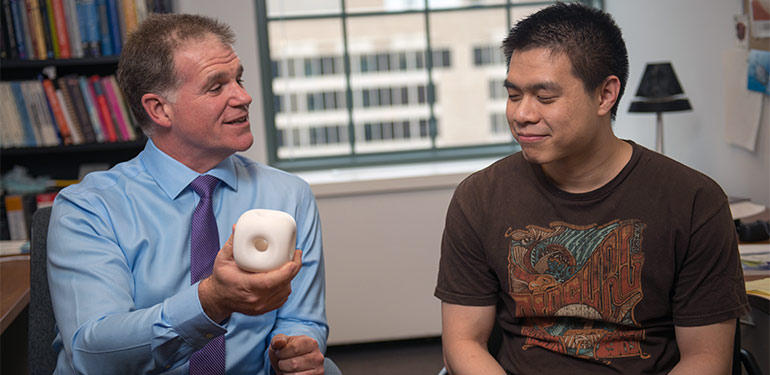About the Department
The Department of Engineering Sciences and Applied Mathematics is an integral part of many research efforts throughout the McCormick School of Engineering and Applied Science, as well as other Northwestern schools such as the Weinberg College of Arts and Sciences and Feinberg School of Medicine.
Our focus on applying mathematics to today's problems, and developing new mathematical approaches to meet the challenges of new problems, provide an unparalleled opportunity for our students to appreciate and understand the diverse applications of mathematics, which make applied math an important and stimulating discipline.
Jump to a Section
Undergraduate Programs
The department offers coursework in applied mathematics. It administers an undergraduate program leading to a bachelor of science in applied mathematics. The applied mathematics program is intended to provide the knowledge necessary for applying mathematical ideas and techniques to the problems that arise in engineering or science.
A host of McCormick-wide special programs are also available to undergraduate students.
Graduate Programs
The department offers two graduate programs in engineering sciences and applied mathematics: a master of science program and a doctoral program. Qualified students with backgrounds in engineering, mathematics, or science are eligible for admission to either program.
The master of science program is designed for students who want a background in basic applied math skills but are not necessarily interested in pursuing PhD studies. The PhD program is designed for students who want to pursue research in applied math at the highest level.
Faculty
The faculty members in the Department of Engineering Sciences and Applied Mathematics include a member of the National Academy of Engineering; editors of a host of journals; and Fellows of societies, such as the Society for Industrial and Applied Mathematics, the American Physical Society, the American Academy of Arts and Sciences, the American Association for the Advancement of Science, the American Academy of Mechanics, and Academia Europaea, Europe’s Academy of Humanities, Letters, and Sciences. Faculty members have received many awards and prizes, including the Cole-Higgens Award for Excellence in Teaching, the Charles Deering McCormick Professor of Teaching Excellence, NSF Career Awards, and the John von Neumann Lecture Prize, the highest honor from the Society for Industrial and Applied Mathematics.
Research
Faculty and students regularly interact with researchers in other departments, using experiments to motivate and validate mathematical modeling, as well as spurring experiments to observe new phenomena predicted by the models. Collaborators can be found in virtually all science and engineering departments within Northwestern, as well as in universities and laboratories throughout the country and the world.
The department conducts research in a number of areas, including fluid dynamics, complex systems, earth sciences, mathematical biology, and social systems, among other areas.
Colloquia & Seminars
The department hosts the Applied Math Colloquium and the Edward L. Reiss Memorial Lectures in Applied Mathematics.
History of the Department
Prior to 1976, McCormick's applied mathematics program was represented by a subgroup within an amalgamated Department of Engineering Sciences, which also included programs in atmospheric sciences, biomedical engineering, and nuclear engineering. In 1976, Bruno A. Boley, then dean of engineering, promoted the development of applied mathematics by renaming the department to its present Department of Engineering Sciences and Applied Mathematics (ESAM). Despite the name change, ESAM continued for several years to house three distinct programs: applied mathematics, biomedical engineering, and nuclear engineering.
In 1977, ESAM began a building process that would soon have it recognized as one of the best programs in applied mathematics. Beginning the transformation was the hiring of Bernie Matkowsky in 1977. Together with Ed Olmstead, who was already at Northwestern, they were given a mandate to build an applied mathematics department.
ESAM continued to grow and flourish with the addition of several faculty members, including Stephen Davis and Ed Reiss in 1979. The department grew to the point that, in 1985, the nuclear engineering program was joined with mechanical engineering and the biomedical engineering program became a separate department. At this point, ESAM became solely focused on applied mathematics.
In the early years of ESAM, the primary research topics in applied mathematics included combustion, classical fluid dynamics, and solid mechanics. Through the addition of new faculty as well as transitions by existing faculty, the research interests of ESAM have broadened and evolved to include emerging areas such as mathematical biology, complex systems, and social sciences, to name a few.
In 2000, Ed Reiss passed away. To honor his many contributions to Northwestern and the applied mathematics community, ESAM instituted a memorial lecture series that bears his name. The lecture series brings prominent leaders in applied mathematics to ESAM and is a highlight of the year.
Later, the Stephen H Davis Lecture was established to honor his tremendous career at Northwestern beginning with the Inaugural Symposium in 2019. The lecture series is dedicated to bringing premier scientists in mathematical fluid dynamics from around the world to Northwestern to continue Davis' legacy.
During its 45-year history, ESAM has graduated more than 200 PhDs in applied mathematics. Many have gone on to hold prominent positions in top universities, laboratories, and companies worldwide. ESAM graduates are in high demand because of their strong commitment to answering practical engineering and scientific questions through mathematics—a commitment that began with the department's founding faculty.

